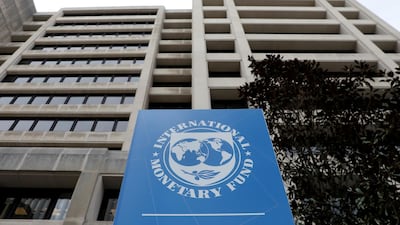The International Monetary Fund is exploring the creation of a trust that could allow its members to lend the fund's reserves to more countries, including middle-income nations vulnerable to climate change.
The Group of Seven high-income countries gave the fund the "green light" to keep working on the plan, IMF managing director Kristalina Georgieva said after the end of the G7 summit in Cornwall, England.
The IMF will continue to work on the “Resilience and Sustainability Trust” – which will help countries to combat climate change or improve healthcare systems – before the July meeting of G20 finance officials.
“Now we have the indication that we have a green light to go ahead, and we will reach out to others,” said Ms Georgieva.
“China has expressed interest to participate, and I would expect there could be other emerging market economies with sound fundamentals and strong reserve positions that may also do the same.”
G7 leaders said on Sunday that they welcomed an expansion of the lender’s emergency reserves, or special drawing rights, by $650 billion and backed plans to give $100bn to the most vulnerable nations.
However, they called on other countries to also participate.
The fund's Poverty Reduction and Growth Trust already allows members to share their IMF reserves.
However, small island states and other middle-income countries that have been hit hard by the Covid-19 pandemic and significant economic downturns are not eligible for funding through that IMF vehicle.
Ms Georgieva welcomed the G7’s commitment to donate one billion Covid-19 vaccine doses as an important step towards ending the pandemic and said discussions would continue within the G20.
The fund has urged rich countries to act amid warnings of a big divergence in the recovery of advanced and developing economies that could undercut demand and disrupt supply chains, which would also affect countries that are recovering at a faster pace.
“This is a moral imperative and an economic necessity,” said Ms Georgieva.
Allowing the gap between rich and poor countries to continue to widen could also trigger unrest.
“We have seen in the past that divergence that leads to more inequality, it creates a breeding ground for more instability in the world,” she said.
Ms Georgieva plans to work with the fund's members in the coming months on how they could reallocate some of their special drawing rights or use budget loans to reach – or even exceed – the $100bn goal.
Countries could also use budget loans and other means to raise the money, she said, noting this was done successfully in the first year of the pandemic when the fund sought donations for its Poverty Reduction and Growth Trust.
The IMF expects its board to formally approve the $650bn special drawing rights allocation in August, paving the way for member countries to donate their unneeded reserves to others in need.
The previously unreported new trust could help broaden the effort and make funds available to more countries, and for broader initiatives, in line with global goals for combating climate change.
Eric LeCompte, an adviser to the UN and executive director of Jubilee USA Network, said the fund’s work on the new trust marked “significant progress” for many middle-income countries also hit hard by the pandemic.
“It means that more countries with needs can get aid and resources to get through the pandemic,” he said.

